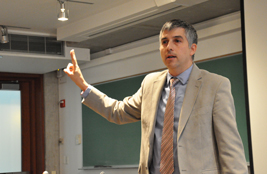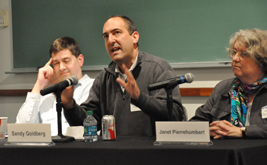Computer Science Everywhere: Northwestern Experts Convene to Discuss Possibilities in CS
McCormick hosted symposium November 14 to spark collaborations between disciplines
For years, computer science was considered the domain of tech experts, programmers, and number-crunchers; today, the discipline permeates all areas of thinking, from social sciences to the arts. This shift toward computational thinking is ushering in a new way of understanding and reimagining the entire world.
With this changing landscape in mind, Northwestern University’s McCormick School of Engineering and Applied Science recently convened some of the University’s top thinkers to discuss ways in which computer science may enhance other disciplines and how those disciplines, in turn, may shape computer science.
“The power of computer science today and in the future cannot be overstated. There is no discipline that will not be reshaped by its impact,” said McCormick Dean Julio M. Ottino. “But these advances will not happen without pooling our strengths, which is why we initiated these events.”
The first “Computer Science Everywhere” symposium, held November 14 on Northwestern’s Evanston campus, began with a series of brief lightning talks. Jason Hartline, associate professor of computer science at McCormick, began with a talk about “CS+X,” ways in which CS can augment and be augmented by other disciplines. Using economics and markets as an example, he noted the ways in which computer science has helped illuminate and improve theories of auction markets. Ken Forbus, Walter P. Murphy Professor of Electrical Engineering and Computer Science, discussed how artificial intelligence can shed light on human cognition, and Bryan Pardo, associate professor of computer science, touched on the thorough integration of computer science into music through thousands of now-commonplace computer applications.
Next, panel discussions were convened, highlighting three broad areas: networks, language and humanities, and education. Northwestern faculty members were invited to share their thoughts in conversations moderated by the deans of three schools.
The first slate of panelists discussed the vast reach of network science; “networks are everywhere,” it was said. This was evidenced by the diversity of the panelists: a computer scientist, a behavioral scientist, a computational neuroscientist, and a social computing expert. That diversity provides opportunities for collaboration and also significant challenges; some networks can be designed, some are being discovered piece by piece. Building a social network, for example, is hardly comparable to networks in the brain.
Given this enormous variability, a central discussion questioned how complex network ideas could be distilled into an introductory course that would serve students from all over campus. The idea was met with excitement, as well as some discussion of how to teach the subject to students without a strong math foundation.
 Merging computational thinking in the humanities has sometimes proved challenging, noted panelists from Northwestern’s English, philosophy, linguistics, and computer science departments. While some projects have gained momentum — such as the infusion of music into computing via programs like iTunes and Shazam, or an endeavor to build spoken word detection systems for under-resourced languages, spearheaded by linguistics professor Janet Pierrehumbert — others, such as hopes to digitize the entirety of the Anglo-Saxon literary canon, have lagged.
Merging computational thinking in the humanities has sometimes proved challenging, noted panelists from Northwestern’s English, philosophy, linguistics, and computer science departments. While some projects have gained momentum — such as the infusion of music into computing via programs like iTunes and Shazam, or an endeavor to build spoken word detection systems for under-resourced languages, spearheaded by linguistics professor Janet Pierrehumbert — others, such as hopes to digitize the entirety of the Anglo-Saxon literary canon, have lagged.
Martin Mueller, professor emeritus of English and classics, argued that a chasm exists between many humanities and technology experts, but that they have much to gain from one another. “There are ‘were’ people, and there are ‘will be’ people,” Mueller said. “And there is room for both.”
Barbara O’Keefe, dean of Northwestern’s School of Communication, questioned whether humanists have embraced computational thinking enough to envision its possibilities.
“The question is, do we have any inkling yet of how to design these tools? First you have to know what you want the humanities to do for you,” she said. “But I personally believe that many of the most amazing opportunities to expand computation are in the fields I work in … so let’s keep it going.”
The third panel began with a discussion of agent-based models for education by Uri Wilensky, professor of learning sciences at the School of Education and Social Policy and professor of computer science at McCormick. Moderator Penelope Peterson, dean of the School of Education and Social Policy and Eleanor R. Baldwin Professor of Education, posed several questions to the panel: what topics must students learn today to succeed in a computer-science-driven world? At what age should they begin?
Brenna Argall argued that the concepts behind robotics should be taught at the elementary level.
“Robotics will experience the same kind of revolution that computers have,” said Argall, June and Donald Brewer Junior Professor of Electrical Engineering and Computer Science and assistant professor of physical medicine and rehabilitation. “But the real robotics explosion won’t happen until people who aren’t engineers start thinking about this problem.”
That expansion of computer science to include all students is key, Wilensky said.
“Sometimes we focus so much on the computer scientists, those who are going to become professionals in this field, that we don’t pay enough attention to the universal need for everyone to have some facility in this area,” he said. “I’d like to see it pushed more toward the universality.”
 Additional “Computer Science Everywhere” workshops will be held in the coming months. Insight gathered from the “Computer Science Everywhere” symposia is intended to fuel collaborations throughout Northwestern and inform initiatives in computer science and other departments in McCormick.
Additional “Computer Science Everywhere” workshops will be held in the coming months. Insight gathered from the “Computer Science Everywhere” symposia is intended to fuel collaborations throughout Northwestern and inform initiatives in computer science and other departments in McCormick.
“This event reminds me why I love university life,” said Sandy Goldberg, professor of philosophy. “When you get smart people together and get them to talk about interesting subjects, magic happens.”
Participants of “Computer Science Everywhere” included:
Lightning Talks: Current Successful Partnerships
- Jason Hartline, associate professor of computer science
Computer Science, Econ, and Markets
- Ken Forbus, Walter P. Murphy Professor of Computer Science
Computer Science, Cognitive Science, and the Mind
- Bryan Pardo, associate professor of computer science
Computer Science, Music, and Audition
Panel I: Networks
Speaker: Noshir Contractor, Jane and William White Professor of Behavioral Sciences
Panelists:
- Fabian Bustamante, associate professor of computer science
- Bill Kath, professor of engineering sciences and applied mathematics and professor of neurobiology
- Haoqi Zhang, assistant professor of computer science
- Julio M. Ottino, moderator, dean, McCormick School of Engineering, Walter P. Murphy Professor of Chemical and Biological Engineering and (by courtesy) Mechanical Engineering and Distinguished Robert R. McCormick Institute Professor
Panel II: Language and Humanities
Speaker: Martin Mueller, professor emeritus of English and classics
Panelists:
- Doug Downey, assistant professor of computer science
- Sandy Goldberg, professor of philosophy
- Janet Pierrehumbert, professor of linguistics
- Barbara O'Keefe, moderator, dean, School of Communication, professor of communication studies and Annenberg University Professor
Panel III: Education
Speaker: Uri Wilensky, professor of computer science and education and social policy
Panelists:
- Brenna Argall, June and Donald Brewer Junior Professor of Electrical Engineering and Computer Science
- Ian Horswill, associate professor of computer science
- Peter Dinda, professor of computer science
- Penelope Peterson, moderator, dean, School of Education and Social Policy and Eleanor R. Baldwin Professor of Education